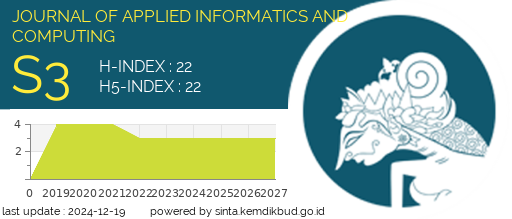Analisis Sentimen Ulasan pada Aplikasi E-Commerce dengan Menggunakan Algoritma Naive Bayes
DOI:
https://doi.org/10.30871/jaic.v6i2.4725Keywords:
Sentiment Analysis, E-Commerce, Naive BayesAbstract
The rapid development of E-commerce has given rise to many marketplaces in Indonesia such as Tokopedia, Shopee, Lazada. Tokopedia, Shopee and Lazada applications are applications that help sellers and buyers to make sales and purchase transactions for goods and services. Until now, of the three major E-Commerce applications, around 100 million users have downloaded the three E-Commerce applications. With the launch of some of these applications, it has caused a lot of opinions and criticisms from the public. Based on this, a sentiment analysis of the Naive Bayes algorithm was carried out to find out how the sentiment of users compares to the E-Commerce application on the Google Play Store. This research uses the Knowledge Discovery in Database (KDD) method which consists of 5 stages, namely data selection, preprocessing, transformation, data mining, and evaluation. The data used is a review of 500 E-Commerce applications per each application. At the data mining stage, it is carried out with 3 scenarios data sharing is 80:20, 70:30 and 60:40. The best results were obtained in scenario 1 (80:20) on the Shopee application using the Naive Bayes algorithm which resulted in an accuracy of 92%, precision of 92.13%, recall of 98.8% and f1-score of 95.35%.
Downloads
References
Arsi, P., & Waluyo, R. (2021). Analisis Sentimen Wacana Pemindahan Ibu Kota Indonesia Menggunakan Algoritma Support Vector Machine (SVM). Jurnal Teknologi Informasi Dan Ilmu Komputer, 8(1), 147. https://doi.org/10.25126/jtiik.0813944
Budiman, A., Yulianto, E., & Saifi, M. (2020). Pengaruh E-Service Quality Terhadap E-Satisfaction Dan E-Loyalty Nasabah Pengguna Mandiri Online. Jurnal Profit|, 14(1), 1"“11. Retrieved from https://doi.org/10.21776/ub.profit.2020.014.01.1
Febrianti, Y. M. (2018). Analisis Sentimen Pada Ulasan "Lazada" Berbahasa Indonesia Menggunakan K-Nearest Neighbor (K-Nn) Dengan Perbaikan Kata Menggunakan Jaro Wingker Distance. Universitas Brawijaya, Malang
Fide, S., Suparti, S., & Sudarno, S. (2021). Analisis Sentimen Ulasan Aplikasi Tiktok Di Google Play Menggunakan Metode Support Vector Machine (Svm) Dan Asosiasi. Jurnal Gaussian, 10(3), 346"“358. https://doi.org/10.14710/j.gauss.v10i3.32786
Goel, A., Gautam, J., & Kumar, S. (2017). Real time sentiment analysis of tweets using Naive Bayes. Proceedings on 2016 2nd International Conference on Next Generation Computing Technologies, NGCT 2016, (October), 257"“261. https://doi.org/10.1109/NGCT.2016.7877424
Hayuningtyas, R. Y. (2019). Penerapan Algoritma Naïve Bayes untuk Rekomendasi Pakaian Wanita. Jurnal Informatika, 6(1), 18"“22. https://doi.org/10.31311/ji.v6i1.4685
Indrayuni, E. (2019). Klasifikasi Text Mining Review Produk Kosmetik Untuk Teks Bahasa Indonesia Menggunakan Algoritma Naive Bayes. Jurnal Khatulistiwa Informatika, 7(1), 29"“36. https://doi.org/10.31294/jki.v7i1.1
Kasmi, K., & Candra, A. N. (2017). Penerapan E-Commerce Berbasis Business To Consumers Untuk Meningkatan Penjualan Produk Makanan Ringan Khas Pringsewu. Jurnal AKTUAL, 15(2), 109. https://doi.org/10.47232/aktual.v15i2.27
Manik, G., Ernawati, I., & Nurlaili, I. (2021). Analisis Sentimen Pada Review Pengguna E-Commerce Bidang Pangan Menggunakan Metode Support Vector Machine ( Studi Kasus : Review Sayurbox dan Tanihub pada Google Play ). Seminar Nasional Mahasiswa Ilmu Komputer Dan Aplikasinya (SENAMIKA), (September), 64"“74
Rofiqoh, U., Perdana, R. S., & Fauzi, M. A. (2017). Analisis sentimen tingkat kepuasan pengguna penyedia layanan telekomunikasi seluler indonesia pada twitter dengan metode support vector machine dan lexicon based features. Jurnal Pengembangan Teknologi Informasi Dan Ilmu Komputer, 1(12), 1725"“1732. Retrieved from https://j-ptiik.ub.ac.id/index.php/j-ptiik/article/view/628/246
Siroj, S. M., Arwani, I., & Ratnawati, D. E. (2021). Analisis Sentimen Opini Publik pada Twitter terhadap Efek Pembelajaran Daring di Universitas Brawijaya menggunakan Metode K-Nearest Neighbor. Jurnal Pengembangan Teknologi Informasi Dan Ilmu Komputer, 5(7), 3131"“3140.
Sirisuriya, S. (2015). A Comparative Study on Web Scraping. 8th International Research Conference, KDU, 135"“140.
Downloads
Published
How to Cite
Issue
Section
License
Copyright (c) 2022 Bintang Zulfikar Ramadhan, Riza Ibnu Adam, Iqbal Maulana

This work is licensed under a Creative Commons Attribution-ShareAlike 4.0 International License.
Authors who publish with this journal agree to the following terms:
- Authors retain copyright and grant the journal right of first publication with the work simultaneously licensed under a Creative Commons Attribution License (Attribution-ShareAlike 4.0 International (CC BY-SA 4.0) ) that allows others to share the work with an acknowledgement of the work's authorship and initial publication in this journal.
- Authors are able to enter into separate, additional contractual arrangements for the non-exclusive distribution of the journal's published version of the work (e.g., post it to an institutional repository or publish it in a book), with an acknowledgement of its initial publication in this journal.
- Authors are permitted and encouraged to post their work online (e.g., in institutional repositories or on their website) prior to and during the submission process, as it can lead to productive exchanges, as well as earlier and greater citation of published work (See The Effect of Open Access).











